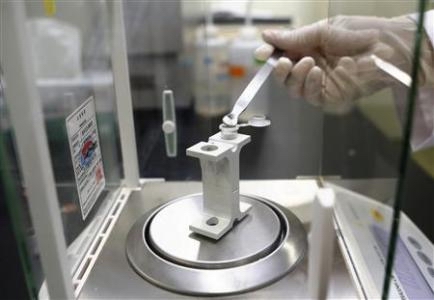
A top official with the U.S. Department of Agriculture said Friday that investigators were "pursuing many avenues" to determine how the wheat - which carries a gene making it resistant to herbicide - popped up in late April.
Although the United States has embraced genetically modified crops such as soybeans and cotton, genetically modified wheat has never been approved in the United States, or anywhere else in the world.
"We have not ... eliminated any" potential causes, said Bernadette Juarez, deputy director of the investigative unit with USDA's Animal and Plant Health Inspection Service.
The wheat found in a northeast Oregon field in late April was developed by biotech giant Monsanto Co (MON.N) more than a decade ago but never put into commercial production.
South Korean millers suspended imports of U.S. wheat on Friday and the discovery of the long-forgotten strain prompted Japan to shun wheat from the Pacific Northwest at its weekly tender on Thursday. The European Union said it would step up testing.
Other Asian countries boosted inspections, but stopped short of imposing import bans.
All involved, from the USDA to farmers to exporters, will be watching for results, expected on Monday, of tests in South Korea on supplies of U.S. wheat and flour to see if any show signs of the errant strain.
The USDA was confident. "There is no indication that any GE (genetically engineered) wheat is in commerce," Ed Curlett, USDA spokesman, said on Friday, based on the investigation so far.
Regardless of the outcome of the tests, the appearance of the mysterious wheat has already fanned new debate over GMO crops and the controls meant to keep their seeds from comingling with traditional crops.
Industry players nevertheless saw few signs of panic, despite concerns that the discovery could cut into the U.S. wheat export business, estimated this week at $9 billion for the current fiscal year.
A major wheat merchant in Canada said he had seen no sign of buyers shifting away from the United States, and expected the nervous response to fade soon.
Wheat futures prices in Chicago, meanwhile, closed at a three-week high.
Monsanto abandoned efforts to commercialize genetically modified wheat after buyers raised concern about safety. Its final field tests on GMO wheat were conducted in 2005.
LOCALIZED IMPACT
The impact of the GMO wheat find has been felt mostly on cash prices in the Pacific Northwest, where Asian countries purchase white wheat grown in Oregon, Idaho and Washington State to use for noodles and other products. Japan bought other classes of U.S. wheat on Thursday at its regular tender.
South Korea - which last year sourced roughly half of its total wheat imports of 5 million tonnes from the United States - has also raised quarantine measures on U.S. wheat bought to feed livestock, while Thailand put ports on alert.
Roy Wyden, a Democratic U.S. Senator from Oregon, on Friday urged USDA to work with other agencies to ensure the discovery of GMO wheat did not become an unfair barrier to trade.
To pin down the origin of the wheat over recent weeks, the USDA extracted DNA from the tissue of wheat plants collected by its investigators from the Oregon field, and sent material to three facilities.
South Korean officials said the United States had provided the DNA sequence of the rogue GMO strain to help Korean inspectors detect if it was in other imported U.S. wheat and flour.
"From this weekend, we will also collect wheat and flour imported from all over the United States and will conduct tests next week," said Ahn Man-ho, a spokesman at Seoul's Ministry of Food and Drug Safety.
South Korean importers say they will not import U.S. wheat until all tests are completed.
TIGHT AUSSIE SUPPLY
Asia imports more than 40 million tonnes of wheat annually, almost a third of the global trade of 140-150 million tonnes. The bulk of Asia's supply comes from the United States, the world's biggest exporter, and Australia, the No. 2 supplier.
Australia will struggle to soak up extra demand as its supplies tighten following unsustainably brisk exports and growing demand from domestic livestock farmers.
"The bulk of grain suppliers (in Australia) are cancelling shipping slots and selling grain to domestic feed mills and feedlots," said Stefan Meyer, a manager for cash markets at brokerage INTL FCStone in Sydney.
Masaaki Kadota, executive director of the Flour Millers Association of Japan, said it would be difficult to find alternatives for the U.S. Western White grade. Wheat grown in nations such as Australia and Canada is mainly the medium to hard type - more suitable for making bread than noodles.
Separately on Friday, Monsanto officials told a German newspaper they were no longer lobbying in Europe for the cultivation of genetically modified crops, having concluded that broad support for the crops there is lacking.





